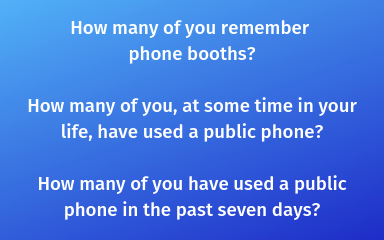
I borrow this series of questions from my colleague, Rev. Peter Boullata. You might also remember that I asked you these same questions about a year and a half ago when I preached about change and generational shifts.
The need to speak on the phone in public persists. We just meet that need differently now. What was once ubiquitous and obvious – for instance, a rotary phone – becomes if not obsolete, rare and antiquated.
Congregations are famous – or infamous – for being one of the last bastions of “But we’ve never done it that way before.” We humans have a tendency to stick with the familiar.
Yet, this mindset leads us to problem-solve by applying past solutions to new challenges, hoping and assuming that will work. Apparently, Henry Ford once said, “If I gave my customers what they wanted, I would have invented a faster horse.”
We can no longer try to invent a faster religious education program.
In this era of no obligation to attend religious services or to be affiliated with a religious institution, in this era of getting one’s needs met through the internet, we Unitarian Universalists and we UU congregations have something deeply meaningful to offer. We’ve just got to figure out how to do it in this new cultural and societal context.
About a year ago, I preached on the necessity of “fail, fail again, fail better.” I raised up to you some of the concerning trends in attendance in our RE program, in UU RE programs across the nation, and said that we would be entering into a phase of experi-learning – trying out new things because the old model of Sunday School was not working and the new next thing to meet the needs of children, youth, parents, and families has not yet been invented.
That said, we cannot let go of that essential quality of a religious education program that we heard about in today’s reading, The Playground Atheist from Jake Morrill, in which our children know that they are not alone.
Perhaps you have noticed that I have been talking about it much more lately. In staff meetings, in one-on-one conversations, in committee and board meetings, and even from this pulpit. Even in the weekly eblast, where week before last I inserted this quote from Religious Educator and Independent Consultant, Kimberly Sweeney:
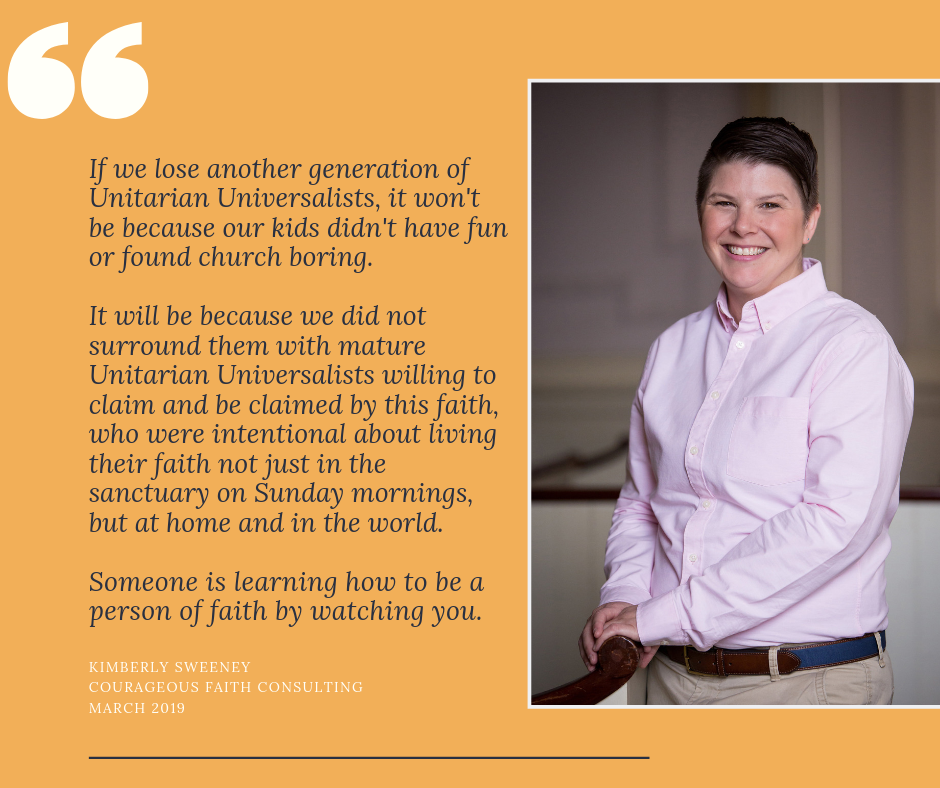
Someone is learning how to be a person of faith (and I will add conscience) by watching you. Someone is watching us, learning how
- to speak with integrity about their spiritual leanings and longings;
- to reach out when there is a death and provide solace;
- to tell the facts about bodies and sexuality and consent;
- to show up when someone who is trans or gender-binary is being harassed;
- to know that families are best defined by love, not the sexual orientation or gender identity of the people in it;
- to reach out across religious differences and side with love with the vulnerable and marginalized; and
- to experience that meaning making can come from some other place than consumer culture.
Many of you in this congregation found Unitarian Universalism as adults. You came out of other religious traditions that you found less than satisfying. This small but mighty religion was here, in congregational form, for you and in some cases, it was life-saving.
If things keep going the way they are going with our children and youth, both nationally and right here, how we have, according to the data that is available, the worst track record for retaining children and youth of any religious tradition in America, it won’t be around for others who had the same need as you, it won’t be around for your children or grandchildren, if we don’t pay attention to the faith formation needs of children in a new way.
I believe that we as a congregation and that Unitarian Universalism can be, and must be, life-saving. What we offer not as political liberals, but as religious liberals, is sorely needed in our world today:
- that wisdom comes from many sources and belongs to no single tradition;
- that human diversity — be it racial, ethnic, national, gender expression, sexual orientation — is natural, holy, and enriching, making the human family whole;
- that both direct experience of mystery and science-based reason can co-exist and do so for the betterment of culture and society;
- that we all are a part of an interdependent web of existence, with mutual reliance and collective liberation at its core.
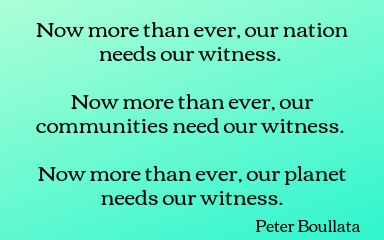
The times are calling us into something new, something unknown, and we are still very much discerning what that is, what it looks like. In order to say yes to the new, there will come a time when we must say no longer to the old; where we will need to let it go, and await, even cultivate the proper conditions, for what is to come.
I believe that we – in this congregation — have already past the point when it comes to age-segregated classroom-type religious education. We just don’t have the attendance to do anything other than a single room approach. Families come, but only once or twice a month – this is true of adults without children, too, but with less noticeable impact on the RE program.
This shift to a one-room Spirit Lab need not be a loss, but rather an evolution to help us meet the spiritual and ethical needs of children, youth, and parents of today.
Judy Lief, a Buddhist teacher I have long admired and whom I got to meet for the first time last weekend, wrote this about transitions:
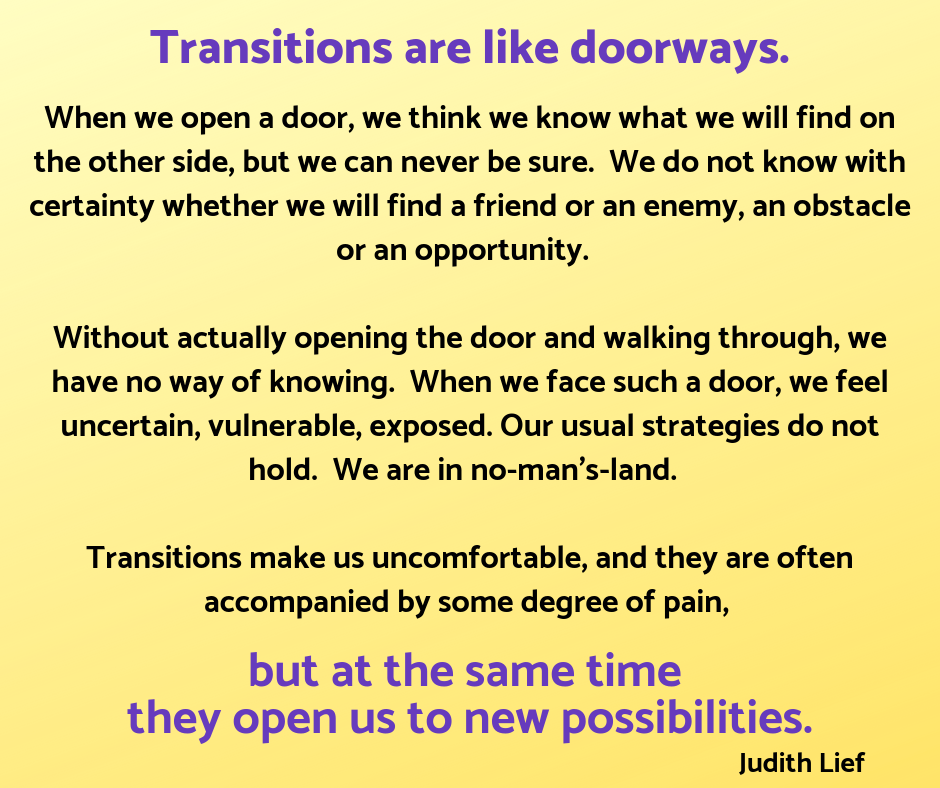
Our religious education program is in a time of deep transition. How do we gracefully let go of what is no longer working? How do we ready ourselves to be open to the new possibilities?
We look to our mission statement, grounding ourselves in our core purpose. We persist in our curiosity about new models and possible innovations. We cultivate imagination to stretch beyond what we have known along with the willingness to sit with unknowing. We come together to figuring it out together.
And by together, I mean: together. Families attending as often as possible (and perhaps a bit a bit more than currently seems possible). Congregants without children in the RE program showing interest and active support, both volunteering and showing up for what has become – yet again – a dormant Religious Education Committee. The Board committing financially with a budget that allows for trying out new possibilities informed by fairly compensated, experienced religious professionals.
What comes after the Sunday School model of age-segregated classes set apart from the rest of the congregation? I have taken classes. I have taken webinars. Currently, I am in what is called “a Community of Practice” for ministers of UU congregations who are actively exploring this challenging aspect of the changing congregational landscape. I can assure you: the next big thing does not yet exist. If it did, I would deliver it to the congregation on a silver platter.
Informed by what the staff of this congregation have been learning, here at TUS, we have been trying out ideas, receiving input, revising and tweaking, and trying the next iteration. At a speed that sometimes makes my head spin. We have been taking to heart the try, try again, fail, fail faster, fail better motto. We have been strengthening that “muscle” that gets us comfortable, or at least more tolerant, of experimentation, of transition, of change.
We didn’t know that we would go through three transitions in religious education staff in one year. While we could benefit from some stability in our program, I’m choosing the frame that we have been expanding our capacity to experiment.
Spirit Lab – our religious education program – began meeting in the Gathering Room a few weeks ago, experimenting with how that larger space impacts delivery of content to one room of age-diverse children. It’s noticeable to the wider congregation because that means a change in coffee hour. We are trying it out this spring to see how it goes.
We learned in the past several years that family attendance drops off in the spring. Last year, we ended the formal RE program the Sunday before the Memorial Day weekend; we will continue with this, having All Ages services in the first half of June, then shift to our summer status, where we provide child care only.
Perhaps you have noticed that there is an increase in All Ages services recently? Welcoming children in this space for the whole service, not dumbing down the content, providing activities to children if they stay in the sanctuary, increasing the age of who can attend child care on those days. Acting as if we are really and truly a multi-generational community. Remembering that there are younger humans watching older humans be people of faith and of conscience. And paying attention to whether this impacts attendance.
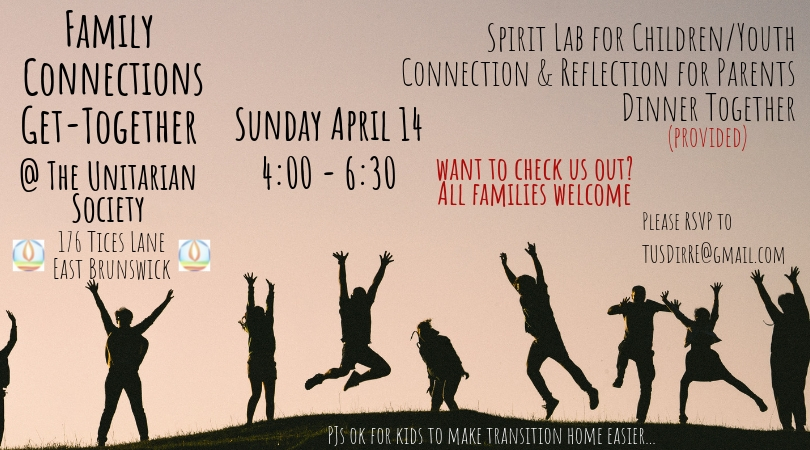
We are also trying something completely new – tonight, in fact – a non-Sunday morning offering for families, centered around dinner, providing content for both children/youth and parents. We’re calling it a Family Connection Dinner and in addition to dinner, it will have a Spirit Lab for the children and one for the parents. It’s a form of Family Ministry. We are wondering if this might be a way to meet the spiritual needs of families, since many of our families are coming only once a month Sunday mornings.
Plus, there is more to come. The Sunday Service Committee has spoken about it, staff whose role is to serve the religious education program have been talking about it, and I’ve checked in with our head of Arrangements. The Board has been discussing these changes, knowing that the budget they recommend to you next year must be informed by what we have learned this past year of transition and a vision for what is to come. I hope you will come to the Annual Meeting on May 19th, whether you are a Member or Friend, for much will be presented, and hopefully you will choose to discuss it all, including the congregation’s vision for the RE program going forward. Plus, if you’d like to have an individual conversation with me about all this, I welcome that as well.
One concrete experi-learning change you can expect, likely in August or September, is a space dedicated to the presence of children in the sanctuary. We’ll try it out for a couple of months, to see how it goes, the check in with how it is going. We may find, like another of our sibling UU congregations, this one outside the Twin Cities in Minneapolis, that inclusion of children made it a bit louder, but it made it also more joyful.
This is how we live into the possibility of a really and truly multi-generational community, one of the few public contexts left for inter-generational interaction as our society grows ever more isolated and ever more segregated.
Let us make sure that we do everything we can so that any child or youth associated with this congregation knows that they, like the Playground Atheist, are never alone. Strike that. So that any person associated with this congregation, no matter their age, knows that they are never alone.
Amen.
[ii] Lief, Judith. Making Friends with Death, p.15.